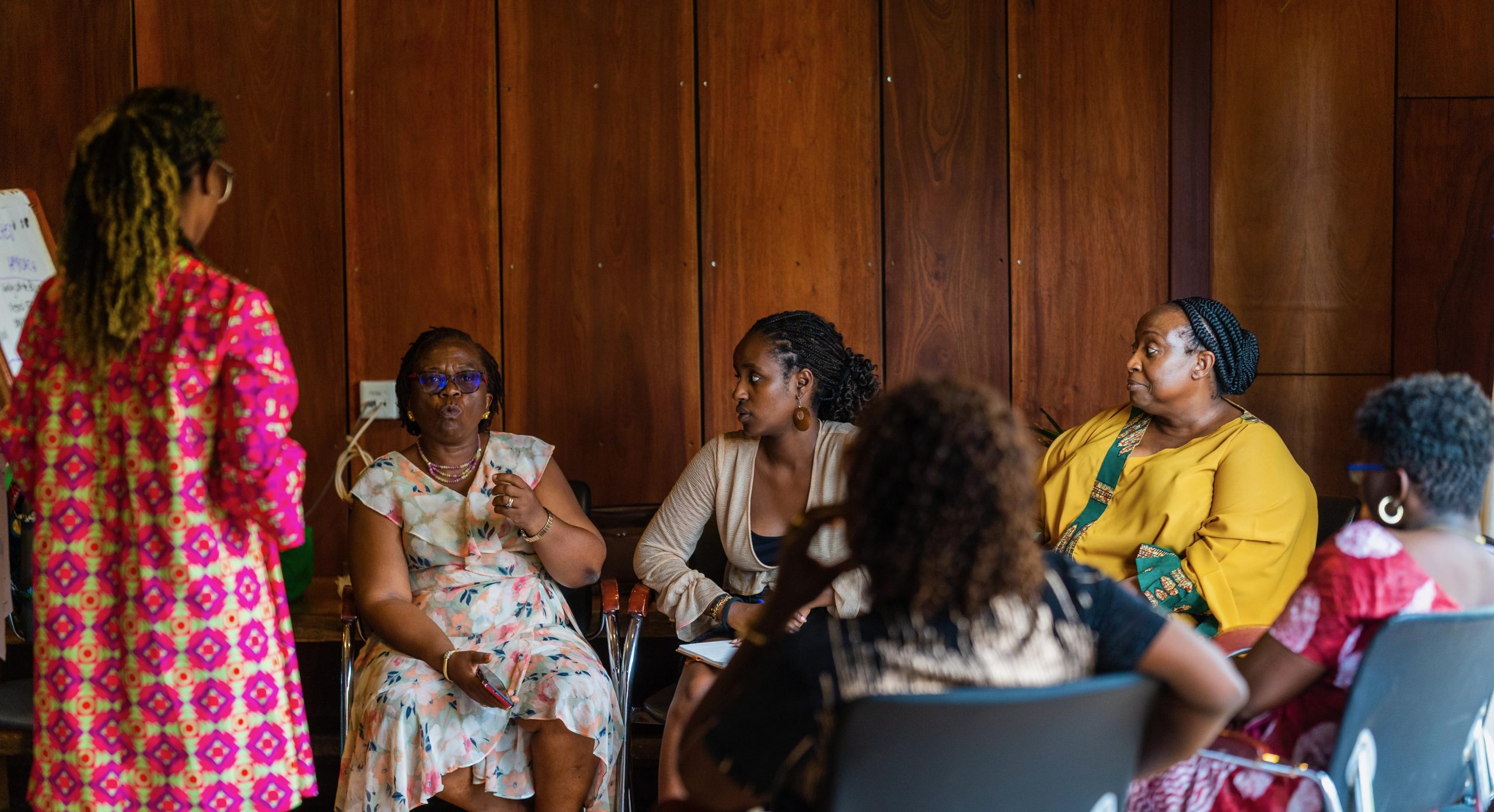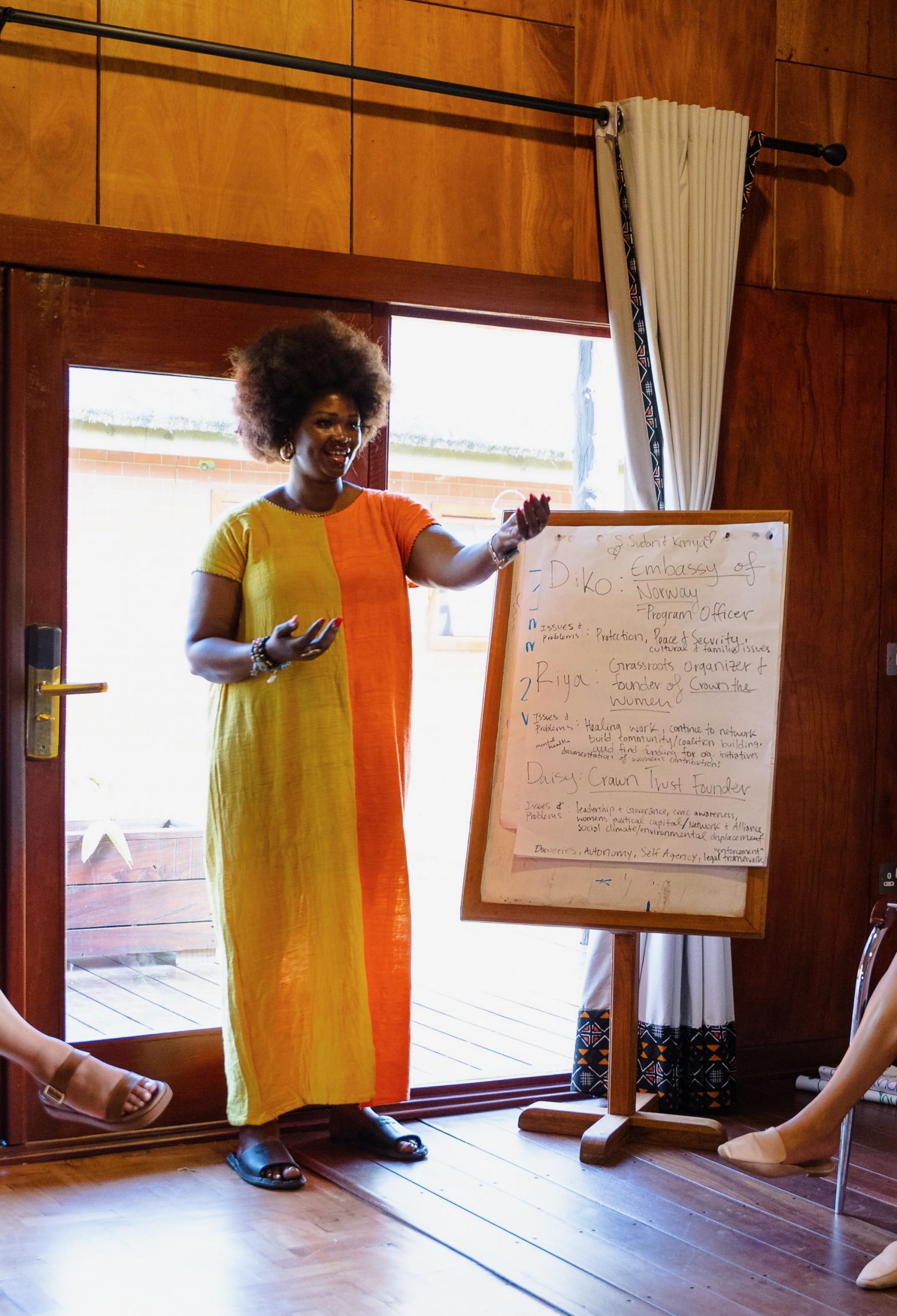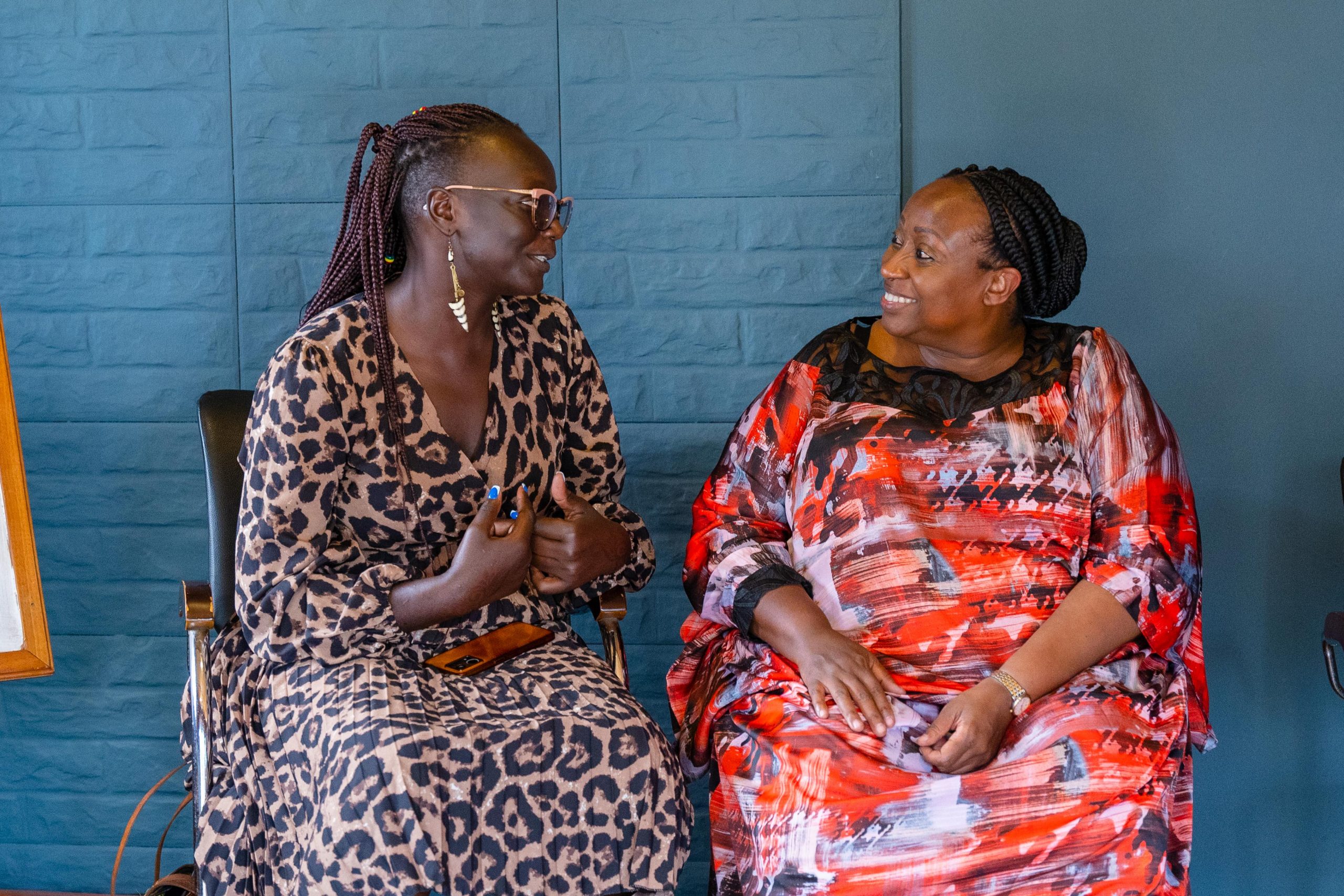
Photo caption: Ms. Ayodeji Evelyn Fadugba, Director of the Kilimanjaro Youth Foundation, Ms. Sandrine M. Sugi, Institute Student Fellow, and Ms. Daisy Amdany, Founder of the CRAWN Trust at the Global Forum in Ghana.
Photo credit: Illuminous Photography
Between November 1-3, 2024, the Institute on Gender, Law, and Transformative Peace convened a diverse assembly of movement leaders, advocates, community organizers, and policymakers for the 2024 Elections Campaigns as Collective Care: A Global Forum. Held in Ghana, the workshop brought together a remarkable group of African women who have devoted their knowledge, energy, and time to advancing gender justice across the continent. In doing so, these leaders and activists contribute not only to transforming the realities of their communities but also to expanding the repertoire of social movement strategies. This article reflects on some of the key organizing strategies shared by Global Forum expert participants from Kenya and South Sudan, two of the eight countries represented at the workshop.
Kenya: Women’s Leadership and Representation, Alliance Building, and Raising Awareness with Narrative Power
Global Forum participant Ms. Daisy Amdany is the founder of the Community Resource Advocacy and Awareness (CRAWN) Trust in Kenya, which champions women’s empowerment in the fields of leadership, governance, and politics, by promoting their inclusion, non-discrimination, and active participation in all spheres of life. Practically, this work involves dynamic community organizing tools, such as capacity building via advocacy campaigning efforts to increase women’s leadership and presentation in politics.
Ms. Amdany’s organization also continues to fight for governmental structural change via constitutional policies. A notable example is the CRAWN organization’s action to demand the dissolution of Kenya’s parliament for failing to enforce women’s educational rights provisions. Constitutional Clause 261 states that Kenya’s High Court “take steps to ensure that the required legislation is enacted, within the period specified in the order, and to report the progress to the Chief Justice…If Parliament fails to enact legislation in accordance with an order under [this] clause…the Chief Justice shall advise the President to dissolve Parliament and the President shall dissolve Parliament.” (Kenya Law Reform Commission (KLRC), 261(6)(7)).
CRAWN Trust also focuses on networking and alliance-building, uniting gender justice organizations across Kenya to cultivate trust and amplify women’s political capital. This effort seeks to address what Ms. Amdany calls the “disorganized majority,” recognizing that while women constitute a majority, they lack unified political power. Throughout the conference, Ms. Amdany emphasized teaching young Kenyan women the power of saying no and building their “capacity to understand political issues.” She asserted that women must have a voice “wherever decisions, including discussions surrounding budgets and governmental policies, are being made.” As Ms. Amdany noted during the workshop session, this ongoing nature of this work is critical: “Elections are not an event, but a process.”
CRAWN’s mission includes reshaping perspectives to envision a future where Kenyan women are organized and politically influential. To do so, the organization undertakes what it calls Information, Education, and Communication (IEC): raising awareness within communities through narrative power, then equipping them with skills and actions to facilitate gender-responsive policy changes. Ms. Amdany beautifully uses language as a transformative tool to inspire collective action by pin-pointing the core issue of many organizing campaigns, the lack of cross collaboration and unity, in the hopes of fostering trust amongst various activist organizations.
Her work underscores the importance of equipping women with social platforms to assert their voices, connect with one another, and claim their rightful place in leadership and decision-making spaces. For example, Ms. Amdany noted the success of CRAWN’s Resource Center for Women & Girls website, which serves as a mapping database for work produced by women’s rights advocacy groups in Kenya. The site, which includes a directory of women’s rights organizations as well as their contact information, has created open communication between activists regionally across Kenya. Ms. Amdany shared in a forum workshop session, “We have already had over 100, 000 people visit the site since its creation (in 2021).”
South Sudan: Psychosocial Support, Documentation and Resource Mobilization

Ms. Yuyada presents on the country context of South Sudan at a Global Forum workshop session.
Photo credit: Illuminous Photography
The Global Forum group consisted of two participants from South Sudan. Ms. Riya Yuyada is a grassroots organizer and founder of Crown the Woman, a non-profit organization that seeks to empower women and girls to harness their potential and contribute to nation-building economically, socially, and politically.
At the Global Forum, Ms. Yuyada highlighted the importance of women activists developing a nuanced understanding of the issues they face. Her activism takes a micro-level approach, focusing on empowering individual women to improve their lives and effectively address gender-based violence (GBV), including domestic violence and sexual abuse, through healing work. In a small group session, Ms. Yuyada posed the question: how can South Sudanese people heal in a country that seems to find itself perpetually in conflict?
While South Sudan gained its independence in 2005, only in 2011 was it formally recognized as a sovereign nation. Since then, South Sudan has struggled with government instability, which further contributes to widespread occurrences of GBV as well as mental and physical fatigue experienced among community organizers and leaders.
Crown the Woman organizes to disseminate mental health resources and provide psychosocial support so that women doing front line care and organizing work can counter frequent episodes of debilitating symptoms of burn-out. Ms. Yuyada explained that a major pillar of her organizational work focuses on “healing us [her people], so that way, we can better heal our land”. One major obstacle Ms. Yuyada continues to face is a shortage of mental health professionals in the region, creating issues of mental health services accessibility for many young women in South Sudan. She explained that this shortage arose from the fact that South Sudan is the youngest nation in the entire world to date; trying to repair years of damage to the nation’s infrastructure and economy, whilst also building political power, has left the budding nation’s government with little resources for robust mental health services.
A passionate advocate of storytelling, Ms. Yuyada continues to critique the lack of global media attention to both the hardships and achievements of South Sudanese women since the country’s independence. She warned that “our stories and histories are being erased,” further emphasizing the importance of documenting her people’s stories to preserve their contributions to the women’s rights movement. Ultimately, she believes that the free flow of information is an integral part of any grassroot organizer’s work; enabling women to heal, advocate, and build capacity in a nation marked by systemic neglect. Ms. Yuyada therefore chooses to empower women by ensuring that their individual stories are shared with the rest of the world. “[F]or activists and for us [Sudanese] in general, it’s very important to talk about documentation…we have women that have been doing all this amazing work. But where is it [documented]?”
Ms. Joyce Diko Duku Tikaya, also of South Sudan, is a women’s rights sports activist and poet. In 2017, she founded the grassroots organization Lady in Action (LIA), a community space for young South Sudanese women to challenge patriarchal stereotypes through sports, and to receive mentorship, training, and psychosocial support. “Lady in Action was a space where young women are mentored to actualize their dreams, using the tool of sports,” explains Ms. Tikaya. Through its mentorship programs LIA functioned as a necessary safe space for women to learn how to become better leaders, develop valuable interpersonal skills through athletics, and ultimately “connect [women] to bigger umbrella institutions that have capacity to address their oftentimes systemic issues”. In a mere few years, Ms. Tikaya’s organization managed to create a South Sudanese tournament for women’s basketball but lost crucial funding and became unable to be revitalized following the COVID-19 lockdown in 2021.

Ms. Tikaya and Ms. Amdany at a Global Forum workshop session.
Photo credit: Illuminous Photography
Ms. Tikaya also works as a program officer for the Norwegian Embassy in Juba, South Sudan. In this role, she has seen how the challenge of funding and resources that LIA faced is widespread across community-based organizations and nonprofits. She spoke to how women activists are too often siloed, with organizations forced to compete with one another due to scarce avenues for funding. “Organization programs should complement each other,” she remarked. “There’s this disconnect… [we] have really become fragmented, all of [us] working in silos and seeing each other as competition, and the men then take advantage of the fact that we are not united.” Ms. Tikaya emphasizes that for the work that grassroot organizers do to be most collaborative and effective, adequate funding is essential for community-based organizations and nonprofits alike in South Sudan.One such organizing tactic for this is resource mobilization within international development spaces. For example, the Peacebuilding Fund Project: Women’s Leadership and Political Participation during South Sudan’s transitional period, is a technical committee established to strategize how best to prepare for the nation’s first ever elections. Elections are set to occur in December 2026, making this task especially crucial to setting precedent for democratic governance as well as promoting healthy civic engagement amongst the nation’s citizens. The committee is made up of UN donors and representatives from international communities that pool together their monetary resources for the Peacebuilding Fund.
This fund is then used to execute various political organizing initiatives across the nation in preparation for South Sudan’s first ever democratic elections. For example, the funds Ms. Tikaya secures ultimately help ensure that: activists receive compensation for their hard work; key research projects continue to be carried out; applications, websites, and national hotlines are properly set up; and that GBV clinics continue to be maintained. Ms. Tikaya explained that “being in this space allows me to give more support to grassroot initiatives, especially in terms of protection…this space provides many services such as mental health resources and planning for women’s safety.”
The Future Ahead
Ms. Amdany, Ms. Yuyada, and Ms. Tikaya, among the many other inspiring participants present at the Global Forum, are living examples of what it means to be an effective and generous community organizer. By sharing their respective organizing efforts and strategies, they not only showcase their expertise in the field, but also sharpen one another’s understanding of what a truly equitable and prosperous future looks like for women across Africa.
Sandrine M. Sugi was a Student Fellow at the Institute on Gender, Law, and Transformative Peace in Fall 2024. Sandrine holds a BS in Sociology and Public Health from the University of Minnesota (Twin Cities) and is set to graduate from CUNY School of Law in 2026 with a JD. She attended the Institute’s Global Forum in Ghana in November 2024.

